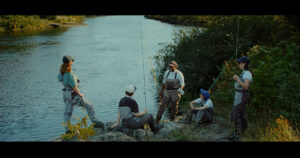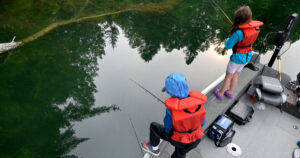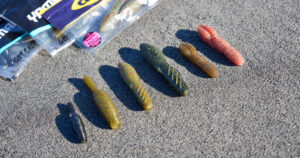
Getting hooked
Get Hooked is a six-part documentary series following four queer millennial women on fishing excursions across Ontario.
Home | Bird brain: Increase your chances of contact
What would a turkey be doing right now? As the day begins, toms will be listening for the yelps of nearby hens. But once the toms fly down from their roost and meet up with hens, the answer to that question becomes less clear. Thinking like a turkey can help clarify things, often putting more birds in front of hunters. I saw this firsthand a few years ago while hunting in Michigan with Al Stewart. The Ontario native worked as the state’s upland bird biologist during the reintroduction of wild turkeys across the US, putting him at the forefront of trap-and-transfer programs. With decades of turkey hunting experience, Stewart has probably spent more time observing these birds than anyone else. Stewart and I set up near roosted birds and had an engaging conversation with some toms. However, after they flew down to meet hens, the toms walked away, never getting close enough for us to take a shot. Stewart then spoke with the landowner about where the birds roosted, analyzed where they might be during the day, then made plans for the following morning. “When I’m out turkey hunting, I always think ‘If I was a turkey, what would I be doing right now?’” Stewart said. This paid off when I harvested a turkey that afternoon after numerous birds responded to the call. Since then, I’ve found that thinking like a turkey brings more birds in front of my gun barrel. Ask yourself... One question you need to ask yourself is: What do turkeys do after the early morning hours when so many of us are hunting? While there are no hard-and-fast rules, turkeys generally aren’t in fields much during midday. Which means they’re heading into the woods. That’s exactly what we did when I hunted with Stewart. We tried to position ourselves between where we thought the birds would be in the middle of the day and where they would go in the evening before roosting. In Ontario, hunting ends at 7 p.m., but turkeys may not roost until after 8 p.m. A hunter who thinks like a turkey, however, would be in the area during the late afternoon, waiting for the birds to return. Hens that have been bred will spend the day sitting on their nests, creating a prime opportunity. Late morning is another excellent time to hunt, especially after hens have returned to their nests. I
Jeff Helsdon calls the turkey-rich woods of southwestern Ontario home. He has hunted turkeys in two Canadian provinces and the United States. Jeff completed a Canadian slam of turkey hunting, bagging eastern birds and a Merriam’s in Western Canada. When he’s not turkey hunting, Jeff enjoys fishing with his family, especially on Lake Erie and hunting for upland game, waterfowl and deer.
Understanding and determining your maximum lethal range for long-range turkey hunting to ensure ethical, accurate, and effective shots.
Read MoreSuccess in turkey hunting is 80% location. Use our tips for choosing the right turkey spot to boost your chances.
Read More
Get Hooked is a six-part documentary series following four queer millennial women on fishing excursions across Ontario.

Three Ontario lodges share their favorite shore lunch fish recipes, all cooked over the fire with their own signature flavors and style.

Permethrin remains unavailable in Canada due to delays caused by a lengthy approval process blocking its market entry.

Fishing with my kids has taught me that slowing down, making it fun, and being present matter more than catching the biggest fish.

Poop baits are so realistic, it’s nearly impossible to fish them wrong—no matter your technique, fish can’t help but strike.

Morel cream sauce brings a favorite spring flavor to a luxurious dish of fish and wild ramps, perfect for seasonal dining.
Contact Information
PO Box 2800 / 4601 Guthrie Dr.
Peterborough, Ontario Canada K9J 8L5
Phone: 705-748-OFAH (6324)
Fax: 705-748-9577
Join Our Newsletter
Watch
Shop
Follow